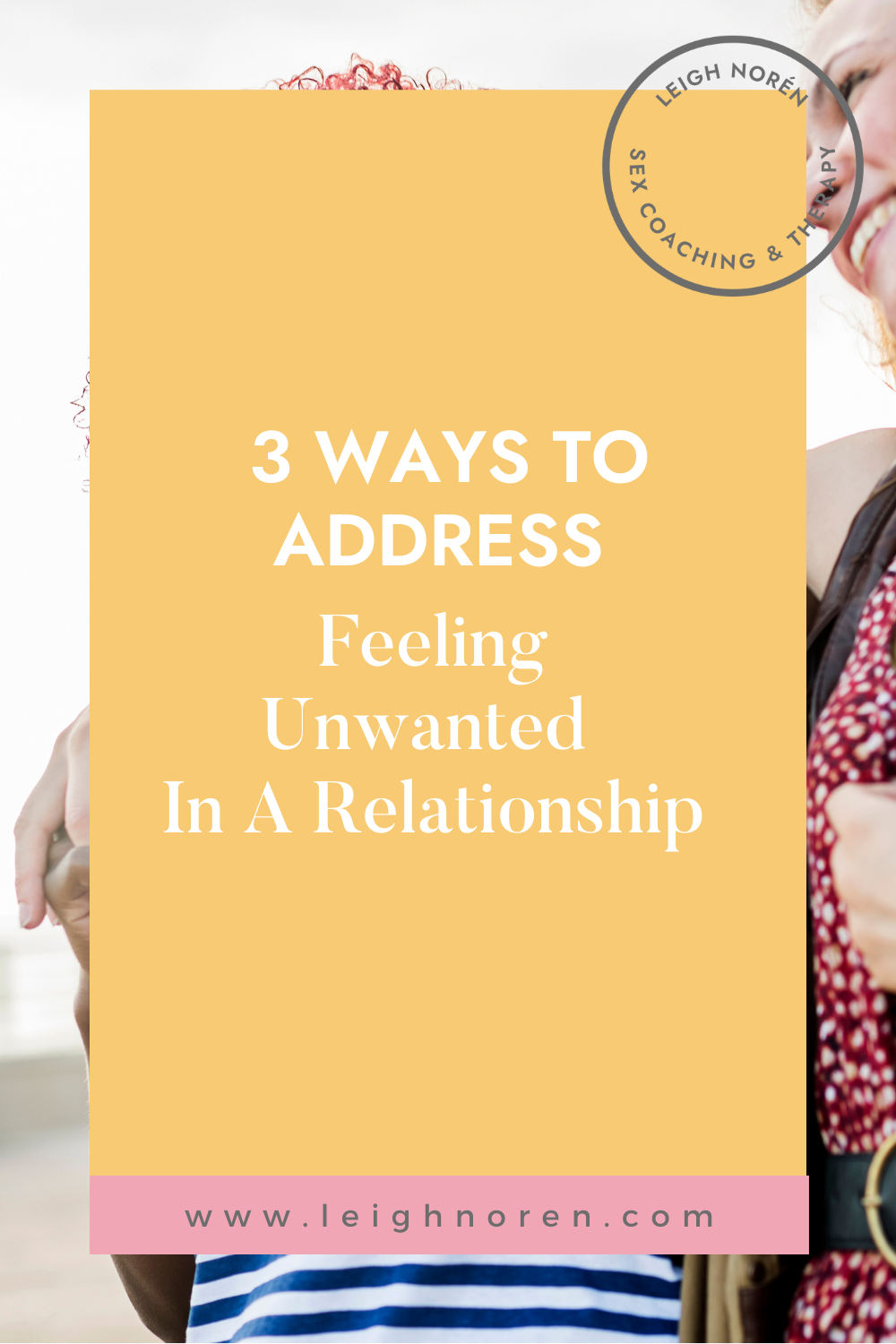3 Ways To Address Feeling Unwanted In A Relationship
8 min read
Some say you feel your loneliest when you’re single. But feeling unwanted in a relationship – that’s can be far more painful than being on your own.
When the person you love stops showing an interest in you sexually, or no longer helps out around the house – it’s time to talk. You both have wants and needs, and even if there isn’t always a perfect solution (because, unfortunately, this is life and not a rom-com from the 90’s) – there’s lots you can do. I promise.
Reasons you may be Feeling Unwanted in a Relationship
First off, you need to get clear on why you’re not feeling appreciated or wanted. Some common factors at play might be:
Lack of emotional closeness:
- Your partner hasn’t shown any interest in how you’re feeling lately
- They forget to ask you about your day or inquire about that problem you had with your friend
- They’re always scrolling their phone during dinner and there seems to be an overall negative impact of technology on your relationship.
Lack of sex
- Your partner has started to shy away from sex
- They seem to be unattracted to you lately
- You feel more like roommates than lovers
Not initiating sex
- While you still have an active sex life – it only ever happens when you initiate
- They never seem to be interested in sex until you’re having it
- They’ve stopped giving you compliments
Not showing an interest in your interests
- The things that matter to you don’t seem to matter to them
- You feel like your interests are made to be frivolous
- They don’t seem to get how important X is to you
Not helping with the housework
- Lately it feels like all you do is pick up after them
- They’ve stopped offering to do the dishes after dinner
- They expect you to organise all meals
Lack of general physical intimacy
- You’ve stopped sleeping in the same bedroom
- There never seems to be time for a snuggle in bed
- Your partner always sits on their own when you watch Netflix
Unfair division of emotional labour
- You’re the one who always makes sure you have a relationship check-in
- They’re more focused on their job than your marriage
- You’re always responsible for booking date nights and coming with new suggestions
All of the above can make you feel emotionally and physically distant – and if unchecked and pushed away – can become a breeding ground for contempt. This is why it’s important talk about how you’re feeling and what you want.
WANT YOUR SEX DRIVE BACK?

My free resource The Desire Test helps you take that first step towards an increased sex drive, by understanding your decreased desire.
Take the 10-page assessment quiz, get the answers you need to understand what’s standing in the way of your desire, and get free sex and relationship tips directly to your inbox. You can unsubscribe at any time.
How to Address Feeling Unwanted in a Relationship
Tell them how you feel without blaming them
“But… they’re the reason I’m feeling unwanted in a relationship – so why shouldn’t I blame them?” I know, I know. When it feels like you’re the one who’s not getting your needs met, you want to jump straight into the blame game.
But even if that’s what you want – it might not be the best way to get what you want from your partner.
In fact – starting off the conversation with how your partner is disappointing you will more likely put them in defensive mode. And when they’re crossing their arms over their chest and walking away in a huff – improvement is less than likely.
So, if you can, share how you’re feeling from an “I” point of view. This goes something like “I’m feeling less close to you than usual and I’d like to talk about what we can do to change that”.
Tell them how much you love them
When we’re feeling unwanted in a relationship and unloved, our first reaction may be to shield ourselves from rejection by shutting down. This can include no longer hugging your partner or ignoring them when you’re irritated.
While this reaction is completely understandable, if you really want to turn things around – it’s important to be open with your partner.
This includes telling them how much they mean to you.
This becomes especially important when sharing negative feelings about their behaviours and the relationship as a whole. Because they need to know you’re coming from a place of genuine care.
It may seem obvious to you – you wouldn’t be angry and disappointed if you didn’t love them, right?
But it might not be obvious to your partner or spouse.
They might be stuck in a feeling of “I can never do anything right”. And when you only share what they’re doing wrong – it creates a vicious cycle of disappointment and low self-esteem.
So, when sharing how you feel, make sure to include how important they are to you. That you’re only sharing this with them because you truly love them. That you want to stay together but there are some needs that aren’t being met and you truly wonder how you can work together to solve them.
Tell them what you want
Sometimes we wish our partner would just get what we want them to do. And even if it would be lovely sometimes if they were mind readers – the fact of the matter is they aren’t. And neither are you (or me!).
For this reason alone, telling them what you want is a necessity. As is giving them examples of how to fulfil your needs.
For example, if you want your partner to help out more around the house; let them know you specifically want them to start picking up the kid’s toys before dinner, or clean the bathroom once a week specifically focusing on the sink.
Whatever it is that is making you feel unwanted – make sure to give them a detailed description of what they could do to make you feel wanted again.
It may be obvious to you and it may feel silly to have to tell them exactly what to do, but this really is the only way you can take strides towards change. Change that mitigates you feeling unwanted in a relationship.
Now – when it comes to unfair distribution of labour in the home – Dr Kate Balestrieri makes a few excellent points worth considering.
The partner who constantly cleans and takes care of the home can start to feel more like a parent, and their partner or spouse more like a child. This can have ripple-like effects on your sex life, as we have an inbuilt disgust reaction to having sex with family members.
So – for the sake of your sex life and overall health of your marriage or relationship – making a point to both pick up around the house can do wonders, alone.
And if you’re up to it – share that tidbit with your partner when telling them what you want! It might just be the motivation they need to start changing.
Communicate with your body-language
When talking with your partner about sensitive topics – remember your body language. Non-verbal cues are just as important as verbal ones when getting your message across. In fact, some argue our body language is even more important than the words we utter.
Non-verbal communication in a relationship that can cause a conversation to be less productive may look like:
- crossing your chest with your arms, signalling you don’t want to let your partner in
- avoiding eye contact in order to mask vulnerability and not show them you’re hurt
- scrolling on your phone while talking in order to decrease your anxiety
While all of the above doesn’t always have to be negative – when feeling unwanted in a relationship – you might be surprised what happens you take both your own non-verbal cues and your partner’s, into consideration.
What is your partner telling you non-verbally? And likewise, what are you telling them? And what happens if you change your body language or make an effort to look into their eyes?
If you hit gridlock while talking about feeling unwanted in a relationship
Conversations like these don’t always go smoothly. If you find yourselves stuck in gridlock – take a break.
We often talk about not going to bed angry, but sometimes that’s exactly what you should do. If you’re both flooded with emotion it will be difficult, if not impossible, to have a productive conversation.
When we get really angry, our fight or flight system is engaged, which means we might find it harder to see the nuances and details of our discussion.
When this happens we’re more likely to hurt one another than actually solve things. If this happens, take a break and do something soothing – go for a walk, vent to a friend, or do some breathing exercises. When you’ve both calmed down – then you can resume the conversation.
If you keep getting stuck in vicious cycles during conversations like these, you may want to consider couples counseling or marriage therapy. Getting help from a mental health professional may be what is needed in order to both get your needs and wants to be met.
What to consider if you feel unwanted sexually
So, you’ve had the conversation and told your partner you want them to initiate sex more. You’ve explained how much you love them and how sex makes you feel closer to them. But nothing changes.
When it comes to sexual difficulties causing rifts in your relationship or marriage – you need to think about things differently.
Because compared to picking up some of the housework or initiating platonic hugs – sex isn’t something you want your partner to “give” you to make you happy.
Sex is a shared experience you want both parties to consent to and enjoy.
As a clinical sexologist, I’ve seen first-hand how having sex for your partner’s sake can turn sex from something you simply don’t enjoy or need – to something you avoid completely. And it makes sense.
Sexual difficulties like low or no sex drive, aren’t solved by having sex we don’t want to have. More often than not this results in sex that isn’t enjoyable – leaving an imprint in our minds and bodies that sex isn’t good for us – further causing our desire to plummet.
So, if you’re feeling unwanted in a relationship because of a lack of sex – get curious about why your partner isn’t interested in the first place. Are they extra stressed lately? Do they never orgasm? Do they feel shameful about sex?
By having an open and honest discussion about sex, and getting curious about their low desire without blaming them for it, you’re helping your partner feel safe, loved, cared for – and appreciated. This is the only way you can overcome different levels of desire. Want more tips? Read my blog post on how to deal with your partner’s lack of libido.
It will get better
Everyone experiences slumps in their relationship. For some, they feel unloved when their partner doesn’t ask them about their day. For others, it’s the ack of sexual intimacy that bothers them the most.
When feeling unwanted in a relationship – make a point to talk about it – sooner, rather than later. Tell your partner how you’re feeling, that you love them, and exactly what you want (without blaming them). You’ll be surprised how much of a difference that can make.
Do you or your partner want to start enjoying sex again? The first step is to understand what’s standing in your way. Download my free resource, The Desire Test, to get the answers to this question. Based on sexological science and my extensive experience as a therapist and coach, it lets you know what you need to work on in order to start loving sex again.

Zero sex drive?
You’re not alone! Download the 10-page Desire Test to find out why your desire for sex is gone (and what to do about it).
Questions based on a variety of factors proven to negatively affect desire
Find out which factors are responsible for your low or non-existent sex drive
Get instant access to expert advice, delivered directly to your inbox when you download The Desire Test. Unsubscribe anytime.
WANT TO KNOW MORE ABOUT THE DESIRE TEST?
With 9 years of experience as a sex therapist and coach - Leigh helps her clients create stress-free, shame-free, pressure-free sex lives, through her unique combination of sexological science, & psychotherapeutic & coaching tools.
OTHER POSTS YOU MIGHT ENJOY
Copyright © 2019-2026 Leigh Norén. All Rights Reserved. | Website by Pinegate Road
Cookie policy | Terms & Conditions | Privacy Policy


